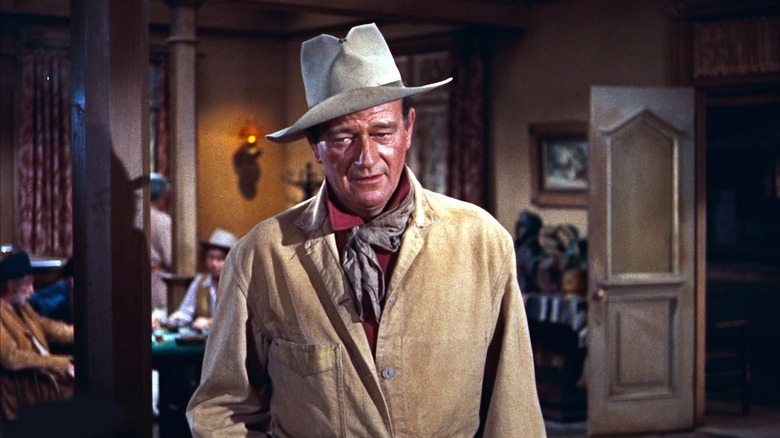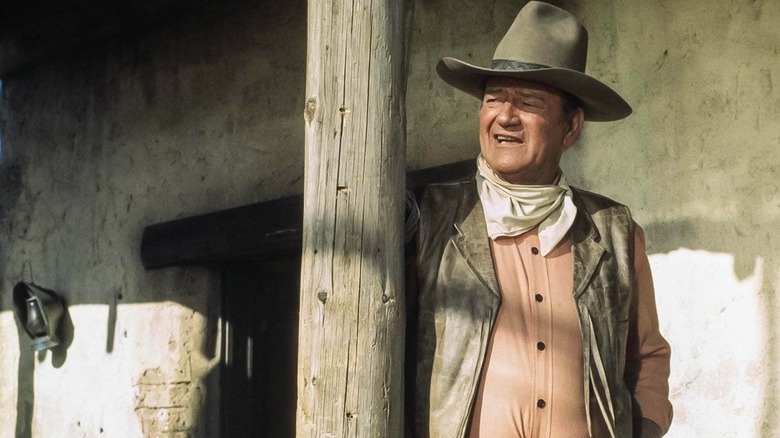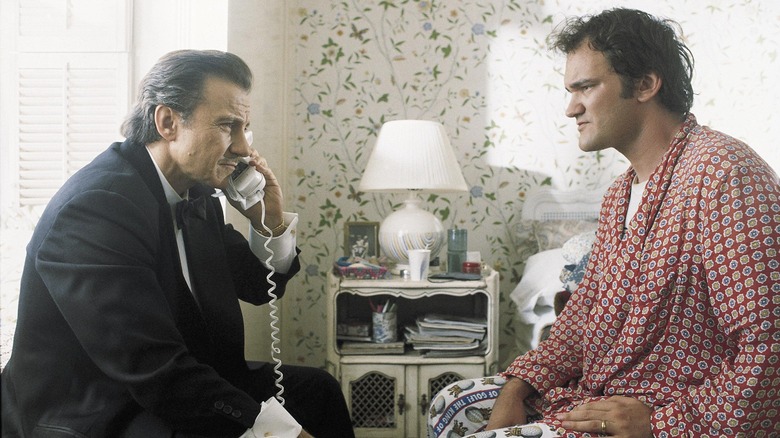How Howard Hawks Inspired Quentin Tarantino As A Director
Quentin Tarantino is as much a film-lover as he is a filmmaker. His work is packed to the brim with references from classic cinema and he often sings the praises of his favorite directors by incorporating their styles into his work. If an artist is only as good as his influences, then Tarantino is one of the all-time greats. The writer-director has cited Howard Hawks as one of his biggest inspirations, as both the best and the worst of Hawks' films have guided Tarantino's choices as a filmmaker.
Howard Hawks is best known for making successful and fondly-remembered movies in nearly every old Hollywood genre, from the musical comedy "Gentlemen Prefer Blondes" to the noir film "The Big Sleep." He also directed the iconic 1959 Western "Rio Bravo," starring John Wayne. Tarantino was first introduced to Hawks when he saw "Rio Bravo" as a child. "The first time I saw it was when I was about five years old with my great-grandmother," the director recalled during a Q&A at a 2007 screening. "I loved it, she loved it."
The director would later re-discover Hawks as a teenager. "When I got into Howard Hawks myself and kind of discovered him on my own around 17," Tarantino said, "I watched 'Rio Bravo' and I was knocked out of the wind. I go, 'That's the movie I saw with meemaw!'" Around the same time, the director also saw "His Girl Friday," a fast-talking rom-com starring Cary Grant and Rosalind Russell. "Then all of a sudden I'm at home, and I notice that a movie called 'Barbary Coast' is being played," he told The Hollywood Reporter in 2012. "And it said in the TV Guide, 'Directed by Howard Hawks,' and so I watched that. Well, those three movies in a row really got me into that director."
Tarantino doesn't want to make Rio Lobo
Howard Hawks was more than just a great artist to Quentin Tarantino, he was also a sort of father figure. "Growing up without a father, Howard Hawks actually had very definite ideas about manhood," Tarantino explained during the 2007 Q&A. "What a man should be, and rules of conduct, stuff like that [...] And discovering him the way I did, without having a male influence around my house or anything, I bought into that and I started adopting his ideas of what a man was. He just kind of guided me through my life as a kind of surrogate, out-there father somewhere."
Tarantino is a huge fan of Hawks to be sure, but he knows he got lucky. The first three films that he saw by Hawks happened to be incredible, but not every movie in Hawks' filmography lives up to his name. One such film is "Rio Lobo," the sequel to "Rio Bravo." Wayne reprises his original role, but all the magic of the first film is missing. Some might argue that one bad movie in such an impressive catalog is pretty good odds, but Tarantino aims to avoid this fate at all costs.
"I fantasize about another 12-year-old girl or boy, 20 years after I'm dead, seeing one of my movies, liking it," the director explained to The Hollywood Reporter. "[Thinking] 'Who the hell did that?' Seeing another movie, and then whatever they choose from the pile — 'cause they don't know what's good and what's bad, all right? [...] I have to keep them wanting to go back for more." To keep new fans intrigued, each new film had to be just as good as the last.
Filmmaking is 'a young man's game'
One of Quentin Tarantino's worst fears is that he will make a film that doesn't live up to the caliber of his other work. He wants unsuspecting new fans to be able to pick blindly from his filmography and still find something they love in each piece, something unmistakably Tarantino-esque. "They can't grab 'Buddy Buddy!'" the filmmaker lamented. "They can't grab 'Buddy Buddy!' It can't — that can't happen!"
"Buddy Buddy" is the notoriously awful 1981 comedy from the acclaimed director Billy Wilder starring Hollywood legends Jack Lemmon and Walter Matthau. The film was a huge disappointment since it was made by three old Hollywood legends that had overstayed their welcome on the silver screen. Their incredible work remains, but they didn't stop creating when they fell totally out of touch. This is Tarantino's greatest fear — he knows for certain that he doesn't want to overstay his welcome in the film industry and end up with a flop like Hawks' "Rio Lobo" or Wilder's "Buddy Buddy." It would taint the integrity of his whole filmography. Not every movie can be the same kind of hit, but even Tarantino admits, "it's a grade point average" (via The Hollywood Reporter).
Tarantino realizes that he doesn't have to be old to make a bad film. "I think I risk failure every single time with the movies I do, and I haven't fallen into failure," Tarantino claimed. However, he added, "I do think it's a young man's game." This philosophy has guided Tarantino to success for years. Hawks' flops were unfortunate, but they taught Tarantino a valuable lesson — quit while you're ahead of the times!


